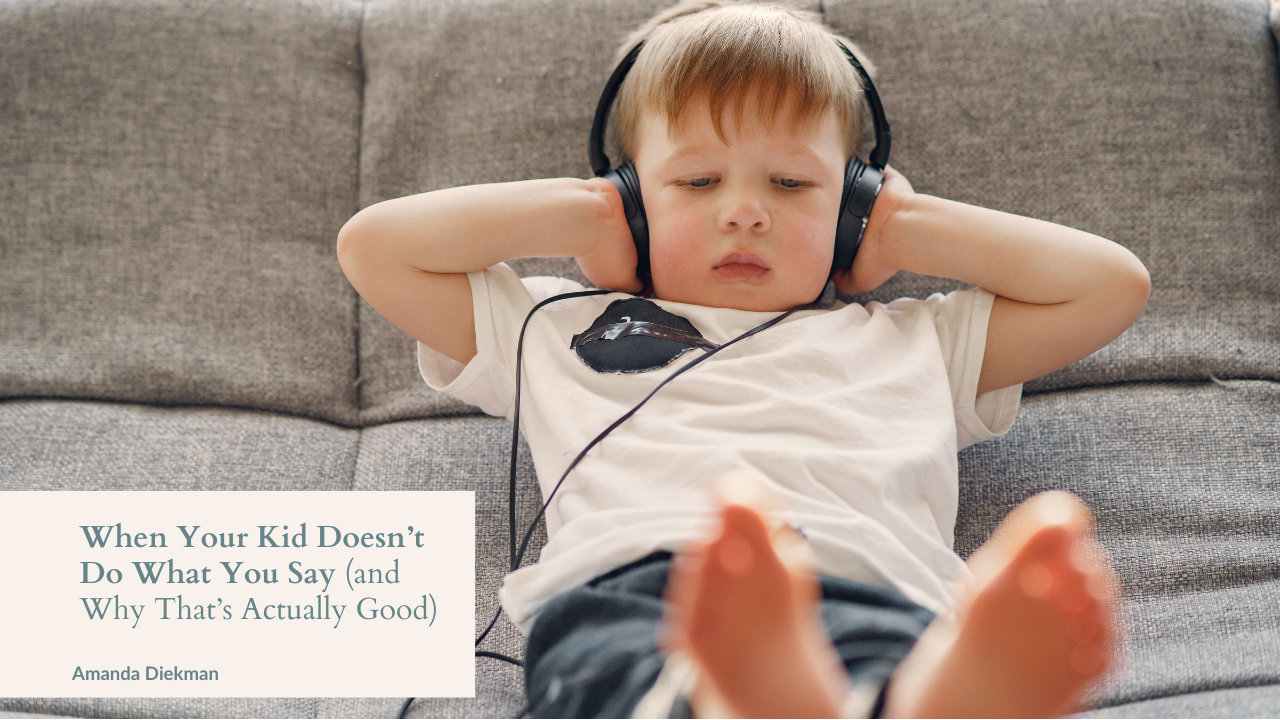When Your Kid Doesn’t Do What You Say (and Why That’s Actually Good)
Sep 19, 2025
I remember so many moments, standing in my kitchen or at the park, watching other kids and their parents.
A grown-up would say, “Shoes on, it’s time to go!” and the child would slide their sandals on like it was no big deal.
Meanwhile, I’d be locked in a power struggle with my PDAer, who not only didn’t put their shoes on when I asked in my kind, sing-song voice—but flat out refused. “No!” “I don’t want to!” “You can’t make me!”
Sometimes my simple requests escalated into yelling. Sometimes it meant hiding under the couch. Sometimes it was a full-on aggressive meltdown.
And then I would spiral: Why can’t my kid just do what I ask? Why is the little stuff always so hard? Why can’t we be like other families?
Why Not-Doing Is Information
In mainstream parenting culture, “not doing what you’re told” gets labeled as defiance, disobedience, or disrespect.
But here’s the truth: when our kids don’t comply, they’re giving us essential information. They’re saying, this is too much for me right now. Their nervous system is sending up a flare, showing us where the demand outweighs their capacity.
That “no” isn’t a moral failure. It’s communication.
Why It’s Good
Yes. I said “good.” Because think about the alternative:
If our kids always complied—whether or not they had the capacity—what would that mean? They’d be shutting down their bodies’ signals. They’d be learning to override their truth. They’d be practicing people-pleasing and masking.
And for PDAers especially, that’s a recipe for long-term burnout, trauma, and collapse.
So when our kids resist, argue, or refuse? It means their self-protection instincts are still intact. They’re fighting for their autonomy. They’re showing us where the stress load is too high. And that means we can listen, adjust, and support them in safer ways.
Moving from Control to Curiosity
Instead of asking, Why won’t they just do it?
We can engage our curiosity and ask:
- What’s making this too hard right now?
- What’s underneath their “no”?
- Can I reduce the demand or add support?
- Do I need to drop or shift this expectation altogether?
This doesn’t mean there are no limits. But it means our limits are responsive, relational, and rooted in nervous system awareness—not rigid scripts or mandatory obedience.
Research Corner
Psychologist Alfie Kohn reminds us that obedience isn’t the gold standard of parenting. In Unconditional Parenting, he argues that compliance-focused strategies might create short-term quiet, but they often sacrifice long-term trust and internal motivation. Similarly, Stuart Shanker’s work on regulation shows us that so-called “misbehavior” is often stress behavior—a child’s nervous system over capacity, not under discipline.
In other words: what looks like “won’t” is almost always “can’t.” What looks like disobedience is actually meaningful communication.
And this “can’t” is a place for compassion, not control.
The Reframe
When your kid doesn’t do what you tell them, it doesn’t mean you’re failing as a parent. It doesn’t mean they’re doomed.
It means you’re being invited into a deeper kind of parenting—one rooted in curiosity, connection, and flexibility.
It means you get to stop measuring your success by how quickly your child obeys and start measuring it by how safe and connected they feel.
And in the long run, that’s the kind of relationship that actually lasts.
A child’s refusal isn’t rejection. It’s information. It’s protection. And it’s good.
Quiz: "Why is everything so hard?"
................
Get your quiz results and discover one concrete next low-demand step toward ease and joy.
Low Demand in your Inbox
Juicy weekly emails include real-life parenting stories, low-demand ideas and tips, plus a collection of my favorite resources. A goodie-box of an email.
We hate SPAM. We will never sell your information, for any reason.

